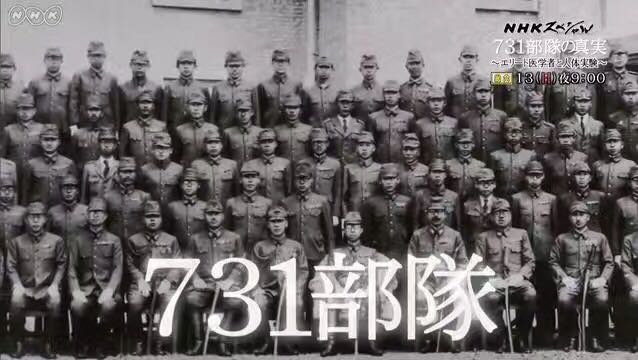


(The screenshot of the documentary)
Japanese national broadcaster NHK recently released a documentary about the atrocities of Japan's notorious Unit 731 during World War II, sparking huge controversy among Japanese netizens.
As other WWII documentaries presented Japan as a victim, NHK interviewed many old Japanese soldiers to tell the public the truth.
Unit 731 was a top-secret biological and chemical warfare research base established in Harbin in 1933. According to data, at least 3,000 people were killed in its human experiments, including civilians and prisoners of war from China, Soviet Union, Korea, and Mongolia. Most members of Unit 731 were arrested by the Soviet Red Army after war and tried at the Khabarovsk War Crime Trials.
According to NHK, the unit thoroughly destroyed evidence and former members were forbidden from talking about it. NHK uncovered a 20-plus-hour voice recording used in the trial, where former members of unit discussed how they conducted human experiments on Chinese and Soviets to develop biochemical weapons.
In addition, famous schools as well as scientists, who were honored after the war, were said to have joined the research.
Japanese politician Koike Akira wrote on Twitter that he felt very sorry about the experiments and thinks Japanese medical elites who escaped punishment should tell the truth.
Japanese netizen “Logi” said the records should be stored, as the Abe government is passionate about destroy such historical files.
A different netizen said Japanese right-wingers describe the war as self-defense rather than aggression, and deny the existence of Unit 731, the Nanjing Massacre, and comfort women.
 Fire brigade in Shanghai holds group wedding
Fire brigade in Shanghai holds group wedding Tourists enjoy ice sculptures in Datan Town, north China
Tourists enjoy ice sculptures in Datan Town, north China Sunset scenery of Dayan Pagoda in Xi'an
Sunset scenery of Dayan Pagoda in Xi'an Tourists have fun at scenic spot in Nanlong Town, NW China
Tourists have fun at scenic spot in Nanlong Town, NW China Harbin attracts tourists by making best use of ice in winter
Harbin attracts tourists by making best use of ice in winter In pics: FIS Alpine Ski Women's World Cup Slalom
In pics: FIS Alpine Ski Women's World Cup Slalom Black-necked cranes rest at reservoir in Lhunzhub County, Lhasa
Black-necked cranes rest at reservoir in Lhunzhub County, Lhasa China's FAST telescope will be available to foreign scientists in April
China's FAST telescope will be available to foreign scientists in April "She power" plays indispensable role in poverty alleviation
"She power" plays indispensable role in poverty alleviation Top 10 world news events of People's Daily in 2020
Top 10 world news events of People's Daily in 2020 Top 10 China news events of People's Daily in 2020
Top 10 China news events of People's Daily in 2020 Top 10 media buzzwords of 2020
Top 10 media buzzwords of 2020 Year-ender:10 major tourism stories of 2020
Year-ender:10 major tourism stories of 2020 No interference in Venezuelan issues
No interference in Venezuelan issues
 Biz prepares for trade spat
Biz prepares for trade spat
 Broadcasting Continent
Broadcasting Continent Australia wins Chinese CEOs as US loses
Australia wins Chinese CEOs as US loses